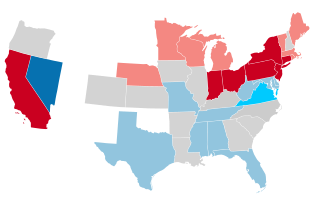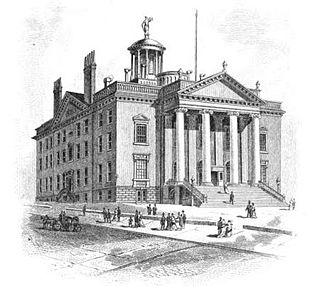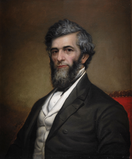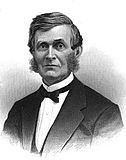Election
In the Assembly, Republicans DeWitt C. Hoyt (Saratoga Co.) and James O. Schoonmaker (Ulster Co.); and Democrats James Irving (NYC), Lawrence D. Kiernan (NYC), Harris B. Howard (Rensselaer Co.), James B. Pearsall (Queens), John Tighe (Albany Co.) and Moses Y. Tilden (Columbia Co.); did not vote.
In the State Senate, Republicans Matthew Hale (16th D.) and Charles Stanford (15th D.); and Democrats Cauldwell, Thomas J. Creamer, Michael Norton (5th D.) and John J. Bradley (7th D.); did not vote.

The 1863 United States Senate election in New York was held on February 3, 1863, by the New York State Legislature to elect a U.S. Senator to represent the State of New York in the United States Senate.

The 1867 United States Senate election in New York was held on January 15, 1867, by the New York State Legislature to elect a U.S. Senator to represent the State of New York in the United States Senate. Incumbent Senator Ira Harris was not renominated for a second term in office. U.S. Representative Roscoe Conkling was elected to succeed him.

The 1873 United States Senate election in New York was held on January 21, 1873, by the New York State Legislature to elect a U.S. Senator to represent the State of New York in the United States Senate.

The 1875 United States Senate election in New York was held on January 19 and 20, 1875, by the New York State Legislature. The legislature, with a Republican Senate and Democratic Assembly, jointly elected Democrat Francis Kernan Senator. Kernan became the first Democrat to represent New York since 1851.

The 1879 United States Senate election in New York was held on January 21, 1879, by the New York State Legislature to elect a U.S. Senator to represent the State of New York in the United States Senate.

The 1881 United States Senate election in New York was held on January 18, 1881, by the New York State Legislature to elect a U.S. Senator to represent the State of New York in the United States Senate.
The 1885 United States Senate election in New York was held on January 20, 1885, by the New York State Legislature to elect a U.S. Senator to represent the State of New York in the United States Senate.

The 1897 United States Senate election in New York was held on January 19, 1897, by the New York State Legislature to elect a U.S. Senator to represent the State of New York in the United States Senate.

The 1903 United States Senate election in New York was held on January 20, 1903, by the New York State Legislature to elect a U.S. Senator to represent the State of New York in the United States Senate.
The 1911 United States Senate election in New York was held from January 17 to March 31, 1911, by the New York State Legislature to elect a U.S. Senator to represent the State of New York in the United States Senate.

The 1896–97 United States Senate elections were held on various dates in various states. As these U.S. Senate elections were prior to the ratification of the Seventeenth Amendment in 1913, senators were chosen by state legislatures. Senators were elected over a wide range of time throughout 1896 and 1897, and a seat may have been filled months late or remained vacant due to legislative deadlock. In these elections, terms were up for the senators in Class 3.

The 1868–69 United States Senate elections were held on various dates in various states. As these U.S. Senate elections were prior to the ratification of the Seventeenth Amendment in 1913, senators were chosen by state legislatures. Senators were elected over a wide range of time throughout 1868 and 1869, and a seat may have been filled months late or remained vacant due to legislative deadlock. In these elections, terms were up for the senators in Class 1.

The 1874–75 United States Senate elections were held on various dates in various states. As these U.S. Senate elections were prior to the ratification of the Seventeenth Amendment in 1913, senators were chosen by state legislatures. Senators were elected over a wide range of time throughout 1874 and 1875, and a seat may have been filled months late or remained vacant due to legislative deadlock. In these elections, terms were up for the senators in Class 1.

The 1878–79 United States Senate elections were held on various dates in various states. As these U.S. Senate elections were prior to the ratification of the Seventeenth Amendment in 1913, senators were chosen by state legislatures. Senators were elected over a wide range of time throughout 1878 and 1879, and a seat may have been filled months late or remained vacant due to legislative deadlock. In these elections, terms were up for the senators in Class 3.

The 1880–81 United States Senate elections were held on various dates in various states, coinciding with the presidential election of 1880. As these U.S. Senate elections were prior to the ratification of the Seventeenth Amendment in 1913, senators were chosen by state legislatures. Senators were elected over a wide range of time throughout 1880 and 1881, and a seat may have been filled months late or remained vacant due to legislative deadlock. In these elections, terms were up for the senators in Class 1.

The 1884–85 United States Senate elections were held on various dates in various states, coinciding with the presidential election of 1884. As these U.S. Senate elections were prior to the ratification of the Seventeenth Amendment in 1913, senators were chosen by state legislatures. Senators were elected over a wide range of time throughout 1884 and 1885, and a seat may have been filled months late or remained vacant due to legislative deadlock. In these elections, terms were up for the senators in Class 3.

The 1866–67 United States Senate elections were held on various dates in various states. As these U.S. Senate elections were prior to the ratification of the Seventeenth Amendment in 1913, senators were chosen by state legislatures. Senators were elected over a wide range of time throughout 1866 and 1867, and a seat may have been filled months late or remained vacant due to legislative deadlock. In these elections, terms were up for the senators in Class 3.

The 1862–63 United States Senate elections were held on various dates in various states, occurring during the American Civil War. As these U.S. Senate elections were prior to the ratification of the Seventeenth Amendment in 1913, senators were chosen by state legislatures. Senators were elected over a wide range of time throughout 1862 and 1863, and a seat may have been filled months late or remained vacant due to legislative deadlock. In these elections, terms were up for the senators in Class 1.

The 90th New York State Legislature, consisting of the New York State Senate and the New York State Assembly, met from January 1 to April 20, 1867, during the third year of Reuben E. Fenton's governorship, in Albany.

The 92nd New York State Legislature, consisting of the New York State Senate and the New York State Assembly, met from January 5 to May 11, 1869, during the first year of John T. Hoffman's governorship, in Albany.












